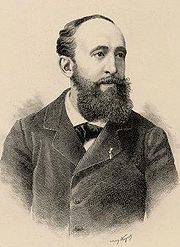
Jules Arsène Arnaud Claretie
Encyclopedia

France
The French Republic , The French Republic , The French Republic , (commonly known as France , is a unitary semi-presidential republic in Western Europe with several overseas territories and islands located on other continents and in the Indian, Pacific, and Atlantic oceans. Metropolitan France...
literary figure and director of the Théâtre Français.
He was born at Limoges
Limoges
Limoges |Limousin]] dialect of Occitan) is a city and commune, the capital of the Haute-Vienne department and the administrative capital of the Limousin région in west-central France....
. After studying at the lycée Bonaparte in Paris
Paris
Paris is the capital and largest city in France, situated on the river Seine, in northern France, at the heart of the Île-de-France region...
, he became a journalist
Journalist
A journalist collects and distributes news and other information. A journalist's work is referred to as journalism.A reporter is a type of journalist who researchs, writes, and reports on information to be presented in mass media, including print media , electronic media , and digital media A...
, achieving great success as dramatic critic to Le Figaro
Le Figaro
Le Figaro is a French daily newspaper founded in 1826 and published in Paris. It is one of three French newspapers of record, with Le Monde and Libération, and is the oldest newspaper in France. It is also the second-largest national newspaper in France after Le Parisien and before Le Monde, but...
and to the Opinion nationale. He was a newspaper correspondent during the Franco-Prussian War
Franco-Prussian War
The Franco-Prussian War or Franco-German War, often referred to in France as the 1870 War was a conflict between the Second French Empire and the Kingdom of Prussia. Prussia was aided by the North German Confederation, of which it was a member, and the South German states of Baden, Württemberg and...
, and during the Paris Commune
Paris Commune
The Paris Commune was a government that briefly ruled Paris from March 18 to May 28, 1871. It existed before the split between anarchists and Marxists had taken place, and it is hailed by both groups as the first assumption of power by the working class during the Industrial Revolution...
acted as staff-officer in the National Guard. In 1885 he became director of the Théâtre Français, and from that time devoted his time chiefly to its administration until his death. During the battle for Octave Mirbeau
Octave Mirbeau
Octave Mirbeau was a French journalist, art critic, travel writer, pamphleteer, novelist, and playwright, who achieved celebrity in Europe and great success among the public, while still appealing to the literary and artistic avant-garde...
's comedy Les affaires sont les affaires (Business is business
Business is business
Business is business is a French comedy in three acts, by the novelist and playwright Octave Mirbeau, performed in April 1903 on the stage of Comédie-Française, in Paris, and worldwide acclaimed, especially in Russia, Germany and United States....
), the Comité de Lecture is abolished, in October 1901, and Jules Claretie becomes the only responsible for choosing the modern plays to be performed.
He was elected a member of the Académie française
Académie française
L'Académie française , also called the French Academy, is the pre-eminent French learned body on matters pertaining to the French language. The Académie was officially established in 1635 by Cardinal Richelieu, the chief minister to King Louis XIII. Suppressed in 1793 during the French Revolution,...
in 1888, and took his seat in February 1889, being received by Ernest Renan
Ernest Renan
Ernest Renan was a French expert of Middle East ancient languages and civilizations, philosopher and writer, devoted to his native province of Brittany...
. The long list of his works includes:
- Histoire de la révolution de 1870-1871 (5 vols., 1875-1876)
- Cinq ans après: l'Alsace et la Lorraine depuis l'annexion (1876)
- some annual volumes of reprints of his articles in the weekly press, entitled La Vie à Paris; La Vie moderne au théâtre (1868-1869)
- Molière, sa vie et son œuvre (1871)
- Les Prussiens chez eux" (1875)
- Histoire de la littérature française (2nd ed. 1905)
- Candidat (1887), a novel of contemporary life
- Brichanteau, comédien français (1896)
Several plays, some of which are based on novels of his own:
- Les muscadins (1874)
- Le régiment de Champagne (1877)
- Les Mirabeau (1879)
- Monsieur le ministre (1883), and others
Claretie also wrote three operas for the music of Jules Massenet
Jules Massenet
Jules Émile Frédéric Massenet was a French composer best known for his operas. His compositions were very popular in the late 19th and early 20th centuries, and he ranks as one of the greatest melodists of his era. Soon after his death, Massenet's style went out of fashion, and many of his operas...
; La Navarraise
La Navarraise
La Navarraise is an opera in one act by Jules Massenet to a French libretto by Jules Claretie and Henri Cain, based on Claretie's novel La Cigarette...
(1894), based on his novel La cigarette and written with Henri Cain
Henri Cain
Henri Caïn was a French dramatist, opera and ballet librettist. He wrote over forty librettos from 1893 to his death, for many of the most prominent composers of the Parisian Belle Epoque....
, Thérèse
Thérèse (opera)
Thérèse is an opera in two acts by Jules Massenet to a French libretto by Jules Claretie. It was first performed at the Opéra in Monte Carlo on 7 February 1907, with Lucy Arbell in the title role...
(1907), and Amadis (1922), a work begun by Massenet in 1895, but shelved and finished in the last years of his life and premiered posthumously.

